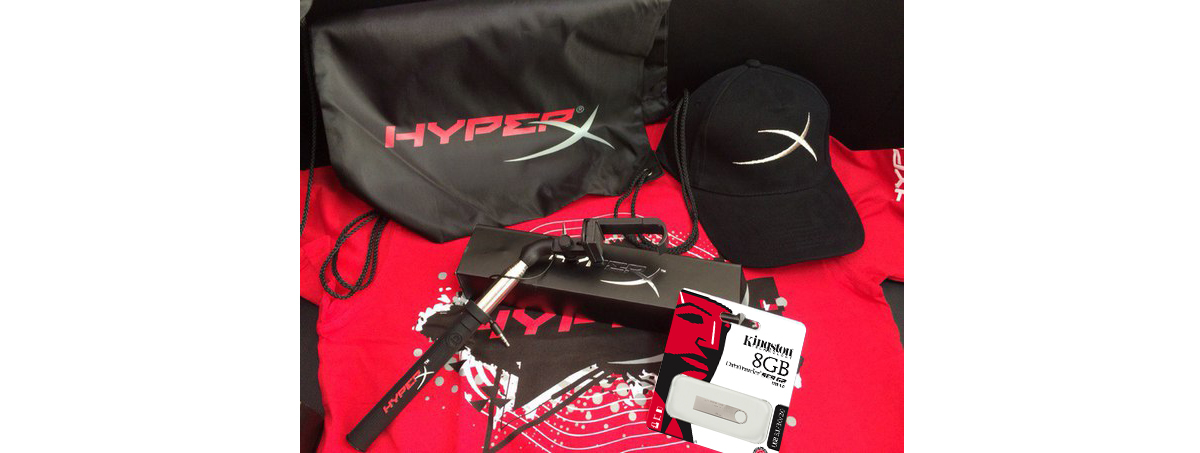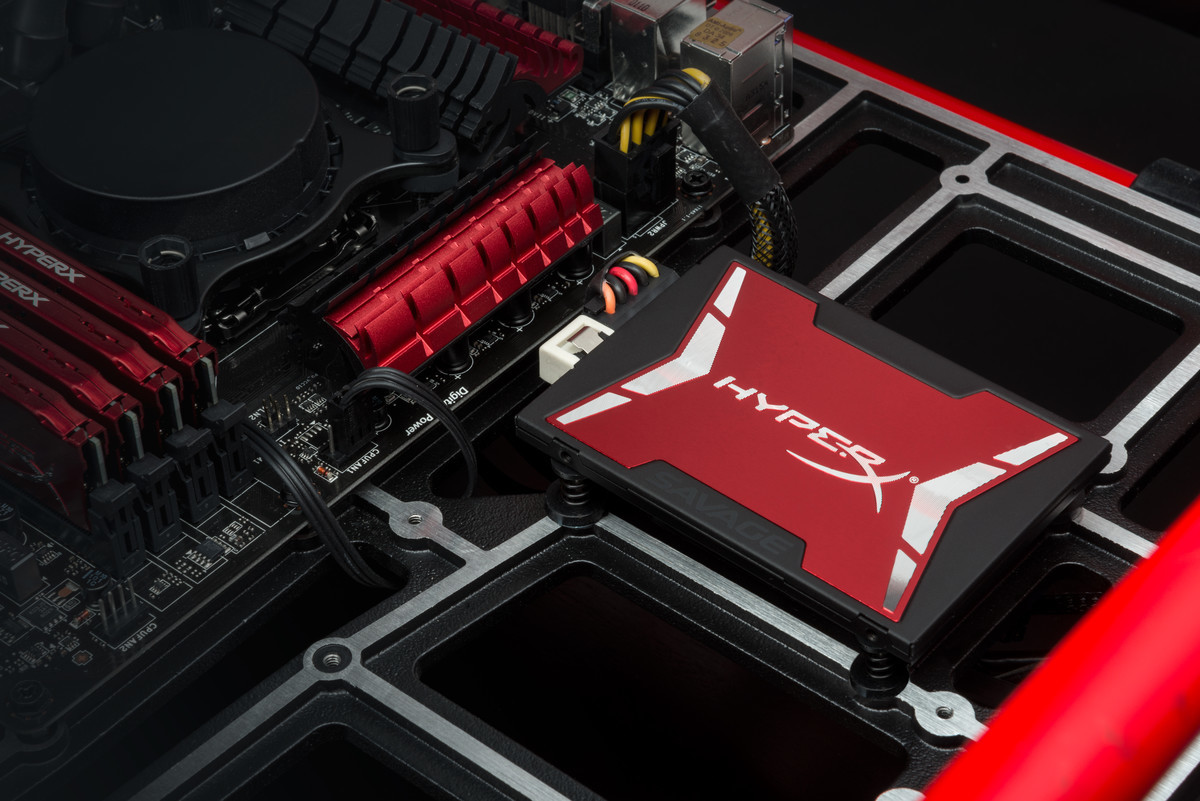The results of the contest "We need your brains" from Kingston
Hi, Giktayms! Whether long or short, almost a month has flown by since the start of the competition for the best testing scenario for Kingston and HyperX products. It's time to announce the winners and distribute deserved prizes and awards. Under the cut, read who got an excellent solid-state drive for the most interesting idea.

I'll start with incentive prizes. In the nomination "Interesting and original" three comments were selected:
')
Option 1 from imm
Option 2 from Raytheon
Option 3 from repobuh
I ask the habrayusers mentioned above to contact them in LAN to clarify the coordinates and send incentive prizes in the form of a gentleman's set: caps, selfie stick, backpack, t-shirts and Kingston DataTraveler SE9 G2 flash drives.

*drumroll*

The main prize gets Foolleren for a whole series of adequate offers.
He gets a productive solid-state drive HyperX Savage with a capacity of 120 gigabytes. Please also contact in the LAN.

In addition to sincere congratulations to the winners, I want on my own behalf and on behalf of Kingston to express HUGE thanks to all who responded to the participation in the competition. We can promise that fragments of the methodology proposed by the winner will be implemented in the next tests, and more than one post may be devoted to RAID research from SSD.
Thank you for your attention and stay with Kingston on Hiktatimes!
For more information about Kingston and HyperX products, visit the company's official website .

I'll start with incentive prizes. In the nomination "Interesting and original" three comments were selected:
')
Option 1 from imm
Please test your SSD and SSD of other brands (for comparison) with fully encrypted TrueCrypt - AES.
It is advisable to pre-clog the disc with 100% any garbage
With such encryption, TRIM is disabled and there is a serious drop in disk performance — hardware compression cannot shake AES.
I think many will be interested in how well your disks will show themselves.
Option 2 from Raytheon
Provide several user profiles in the article:
The “housewife”, which has 50 tabs with a cheerful farm, has a C: disk cluttered up, and even a bearded admin with a full set of Tsisko certificates will be afraid to look into autoload.
"Gamer", running skype, several tabs in the browser and some Dota / WoW / Lineage, between which it is actively switching. Yes, and he has a torrent.
“Enthusiast”, with the PC turned to the limit, which is ready to kill for the sake of an extra frame per second or a percentage of productivity. A browser running ixbt or overclockers is running, several performance counters, the interface has been cut down, all possible extra services are disabled.
What will it give? You can clearly show the following things:
slow computer operation is not always the fault of the installed iron;
even in difficult conditions, your memory / RAM works better than that of colleagues from Villaribo;
Demonstrate the boundaries for which you should not go and give advice on optimizing user experience;
Option 3 from repobuh
And why not test in CAE-applications, preferably with heavy models that require a lot of memory. The audience here is relevant (articles on the study of the audience have appeared here repeatedly), about 30% are faced with resource-intensive tasks.
The memory test will be extremely interesting in two cases - a fast and slow processor (option: 1 stream / 8 streams, HT not to offer), preferably using AVX / FMA instructions. Well, the temperature would help, such tasks often work 24/7.
The SSD test will be interesting not only in the model loading speed, but also when performing Out-Of-Core calculations, of course, also with rather big tasks (in my tasks about 700GB of data are generated per day, about 2TB goes to reading; and this is not the fastest FX-6300@4.1, software gives about 85% of peak performance). It will be interesting to compare modern SSDs with popular on SF22xx and some average RAID0 (a kind of “RAID from your workstation”, not the freshest and not the fastest), as well as their results in popular benchmarks. Well, it would be nice to also evaluate the working temperatures and squeeze a couple of disks to evaluate their resource (TechReport has already done this, but many new disks have since appeared ...): perhaps the effect of using SSD will cover the costs associated with their limited resource, time, too, costs money, especially specialist time.
To increase the “usefulness” - it would be possible to supplement with tests for “tyzhpogromistov”, they are also interested in how many useful and important things they will have time to do, while “it is compiled”.
I ask the habrayusers mentioned above to contact them in LAN to clarify the coordinates and send incentive prizes in the form of a gentleman's set: caps, selfie stick, backpack, t-shirts and Kingston DataTraveler SE9 G2 flash drives.

*drumroll*
And the Oscar goes to ....

The main prize gets Foolleren for a whole series of adequate offers.
me as a potential buyer of glands
from ssd interests the following
A) reliability, but this group of dough is unfortunately the most difficult and probably more expensive.
known cases of reliability problems
1) turning off when power is lost
2) information loss / damage in case of power loss (not the one that was recorded) - repeatedly cut off the power during operation, (in general, this version of events is not excluded when opening a working computer - it touched the power cable and the disk "fell off") I also had cases with a strong interference with the power supply (I would like to know what kind of pulsation the power supply will withstand) on one of the 4 hard drives I ended up with just a mistake in the recording process, but what about the SSD?
3) charge leakage from the floating gate (this is a very long test, but I would like to know whether the recorded information on the disabled ssd will withstand half a year and how fast the reading will go after that.
4) "wiping" the memory during long-term operation. Yes, everything is very simple and long, we record the disc to the core and begin to linearly rewrite a piece that is 2 times more cache (if there is one on the disc) at the same time we will see how the recording speed drops.
Volume (C :)
2016-02-19 02:20:12
Total Read 391.03GB
Cached Read 329.27GB
L2Storage Read 0
L2Storage Write 0
Total Write 286.49GB
Urgent Write 585.15MB
Normal Write 34.46GB
Deferred Blocks 7048
Trimmed blocks 5267868
Free Cache (L1 / L2) 704.13MB / 0
Cache Hit Rate 84.21%
The cache report that allowed me to fool the crystalmark.
Total Write 286.49GB how many came to write for the disk,
Urgent Write 585.15MB Normal Write 34.46GB recorded as much on the disk when the cache was full and in normal mode
The difference is very noticeable do not plan a similar solution for your products? But for free?
B) speed
1) the greatest difference from hard disks is observed when accidentally accessing by sectors 4k is the main parameter, to which I pay attention, this is the typical cluster size when partitioning the system disk in the NTFS file system, the typical queue depth for a home machine is 0.2-2 therefore I consider reading and writing tests to be carried out with such depth.
2) linear read / write, after the hybrid ssd met, the recording speed of 2 gigabytes ceased to interest in principle, the whole process of recording the entire disk is interesting, the marketing figures are not interesting. This means that you need a schedule of reading and writing the entire disk from beginning to end, and then you stick a 5 GB cache and flaunt 500 GB / s, but as a cache it’s clogged there and 200 will not, and if the garbage collector hasn’t yet passed HDD level can slip
3) I constantly meet stupid questions “and what will happen if I push it into a raid”, I always answer that there is nothing good, but people are constantly engaged in this, and test your SSD in hardware 0 Raid 1 and Raid 10 and software from Windows and Linux both on Intel motherboards and on motherboards amd (for good a few more discrete controllers) - so that the user immediately knows what to hope for. And since problems are expected with a non-working TRIM, it is necessary to show the speed in the fresh, crammed, and after the garbage collection raid.
About the PCI-E SSD line as an amateur overclocker, it’s also interesting what range of frequencies the media will sustain.
The rest of the techniques of interest are sort of suggested.
He gets a productive solid-state drive HyperX Savage with a capacity of 120 gigabytes. Please also contact in the LAN.

In addition to sincere congratulations to the winners, I want on my own behalf and on behalf of Kingston to express HUGE thanks to all who responded to the participation in the competition. We can promise that fragments of the methodology proposed by the winner will be implemented in the next tests, and more than one post may be devoted to RAID research from SSD.
Thank you for your attention and stay with Kingston on Hiktatimes!
For more information about Kingston and HyperX products, visit the company's official website .
Our previous posts:
- HyperX Impact memory lines - mobile - does not mean slow
- HyperX DDR3 memory rulers - what is what in the model range?
- HyperX DDR4 memory rulers - what to choose for your computer?
- USB drive HyperX Savage USB 3.1 Gen 1 with a capacity of 128 gigabytes
- Interesting facts from the history of solid-state drives
Source: https://habr.com/ru/post/368351/
All Articles